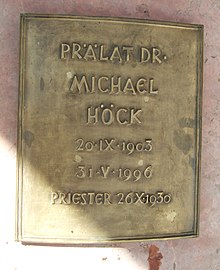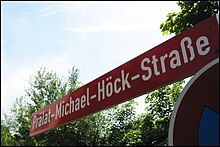Michael Höck
Michael Höck (born September 20, 1903 in Inzell ; † May 31, 1996 in Freising ) was a German clergyman , editor-in-chief of the Münchner Katholische Kirchenzeitung (MKKZ) and member of the Munich Ordinariate . As a Nazi opponent, he was imprisoned in the Dachau concentration camp from 1941 to 1945 .
biography
School and academic career
Michael Höck was born on September 20, 1903 in Inzell. At the age of 13, he took the entrance exam for the Progymnasium in Scheyern in 1916 and, because of his age, entered the second class. After completing the Progymnasium, Michael wants to become a world priest - in contrast to his brother Johannes , who enters the Scheyern monastery to become Benedictine (and later Abbot of Ettal 1951–1961 and Abbot of Scheyern 1961–1972).
From 1920 Höck attended the state grammar school ( Dom-Gymnasium ) in Freising as a boy seminarist until he graduated from high school in 1924. After that, in May 1924 he began studying theology at the Philosophical-Theological College in Freising . In the same year Cardinal Faulhaber found him a place at the Germanikum in Rome. There he studied the prescribed three years of philosophy and four years of theology and was ordained a priest before completing his theological training on Christ the King's festival in Rome in 1930 .
In 1931 he returned to Freising, where he became prefect in the Archbishop's seminary for boys and religion teacher in Freising schools until 1934.
Resistance to National Socialism

The approaching Nazi dictatorship brought him unrest and worries at this time. Höck's superior, the seminar leader, clergyman Josef Roßberger , is sentenced to eight months in prison for making a critical statement against the communist authorship of the Reichstag fire that the Nazis claimed. In September 1934 Michael Höck was appointed editor of the Münchner Katholische Kirchenzeitung . Because he repeatedly "between the lines" expresses his aversion to National Socialism, he has to fight with the Gestapo in Munich and also with the Reichsschrifttumskammer in Berlin. From 1935 onwards, the Gestapo confiscated individual numbers of the church newspaper . Because Höck does not receive approval as editor from the Reichsschrifttumskammer, he officially takes over the post of cathedral deficit at the Frauenkirche in Munich, but continues to work unofficially on the church newspaper. In April 1940 the church newspaper was finally banned, and Höck was tried in October 1940. In January 1941 he was acquitted, but Höck was not served with a judgment. In May 1941 Michael Höck was arrested by the Gestapo while he was taking religious instruction in Feldmoching and transferred to the “Alex” remand prison on Alexanderplatz in Berlin . He was transferred to Dachau on July 11, 1941, via the Oranienburg concentration camp near Sachsenhausen, together with Johannes Neuhäusler (later auxiliary bishop of Munich) and Martin Niemöller . He was interned there as a special prisoner until April 5, 1945. He is then admitted to the Scheyern Monastery, where his brother Johannes is also staying.
Work as a clergyman after 1945
In 1945 he was called by Cardinal Michael von Faulhaber to rain the seminary on the Domberg in Freising. He held the office of rain until 1958. He then returned to pastoral care as the pastor of the Chiemsee community in Rimsting . In 1963, Cardinal Döpfner brought him to Munich as a priestly advisor and ordinariate (until 1968). From then on he also held the office of church rector of the cathedral in Freising, which he held until his retirement in 1988. From 1968 to 1974 he was also the director of the Freising Education Center . From 1971 to 1977 he was a board member of the Society for Christian-Jewish Cooperation in Munich .
Since 1951 he was an honorary member of the Catholic student association KDStV Aenania Munich .
He is buried in the cloister of the Freising Cathedral.
literature
- Volker Dahm , Albert A. Feiber, Hartmut Mehringer , Horst Möller (eds.): The deadly utopia. Pictures, texts, documents, data on the Third Reich. 5th, completely revised and expanded edition. Munich 2008, ISBN 978-3-9807890-7-3 .
- Marion Detjen: Appointed an enemy of the state. Resistance, resistance and denial against the Nazi regime in Munich . Published by the state capital Munich. Munich 1998, ISBN 3-927984-81-7 .
- Hans Niedermayer: Nothing comes from anything. Portraits of former students of the Freising Dom-Gymnasium . Freising 1991.
- Angelika Pisarski: So as not to die in silence. Conversations with survivors from concentration camps . Munich 1989.
Web links
swell
Individual evidence
- ^ The chairmen of the Munich Society. In: gcjz-m.de. Retrieved June 18, 2013 .
| personal data | |
|---|---|
| SURNAME | Höck, Michael |
| BRIEF DESCRIPTION | German clergyman |
| DATE OF BIRTH | September 20, 1903 |
| PLACE OF BIRTH | Inzell |
| DATE OF DEATH | May 31, 1996 |
| Place of death | Freising |



